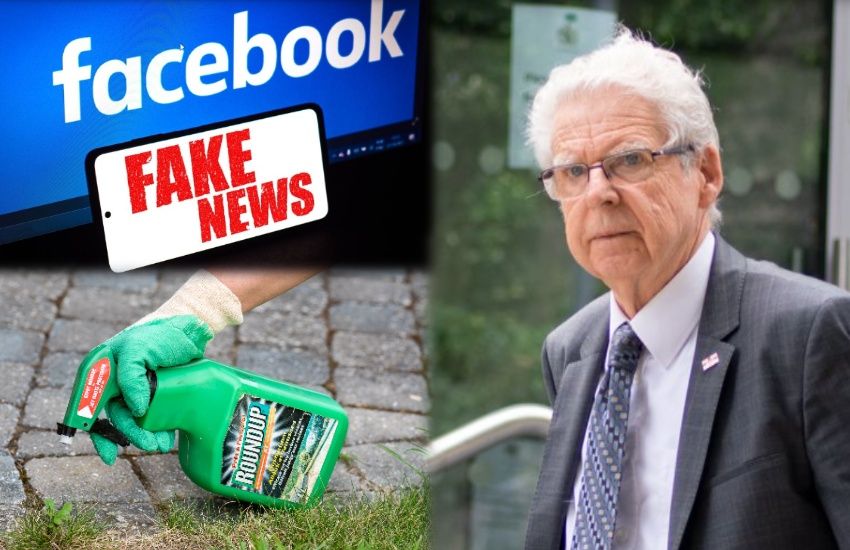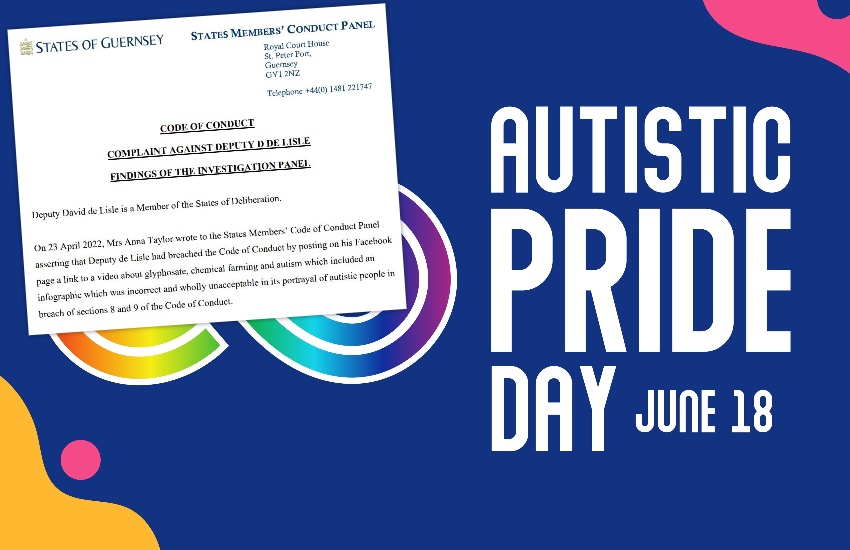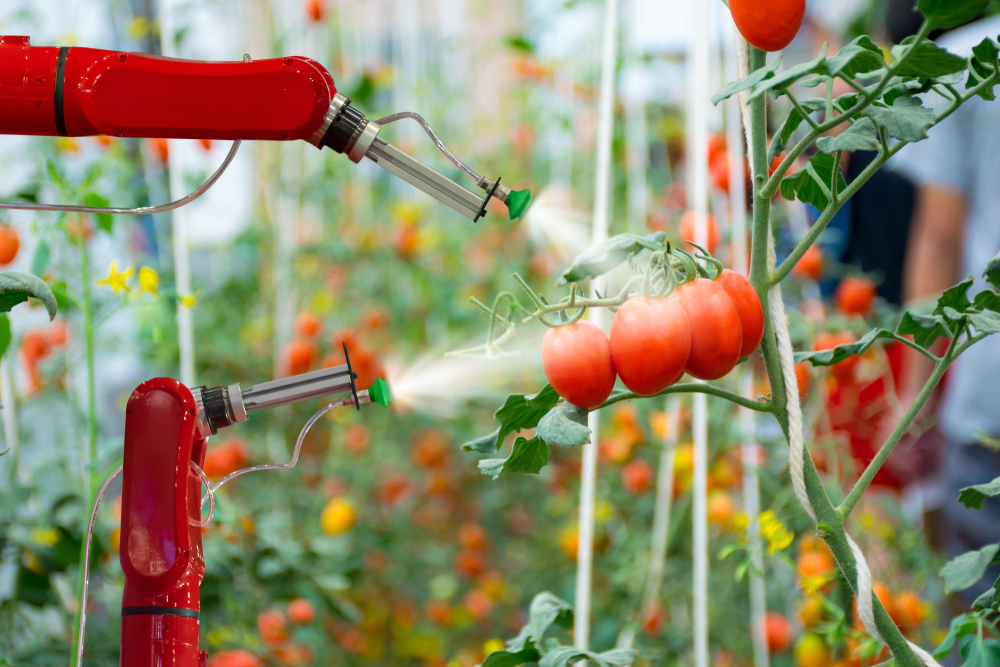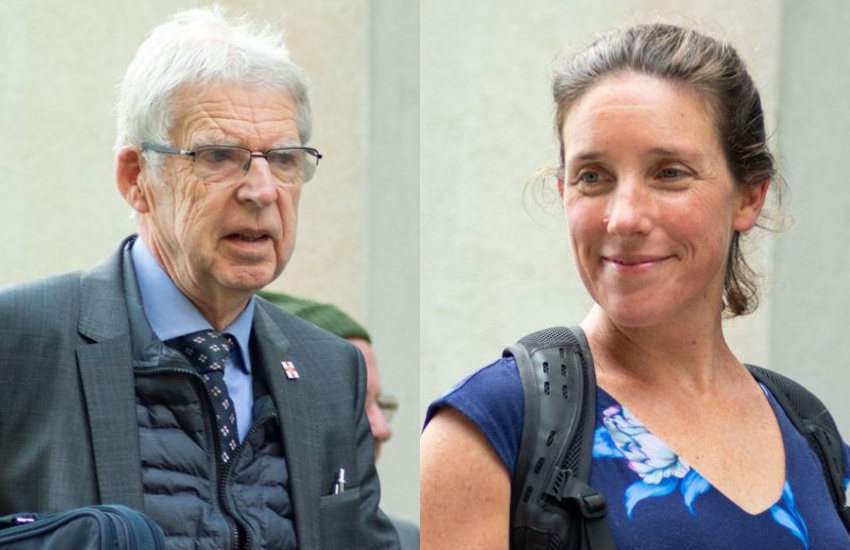


Deputy David De Lisle broke the Code of Conduct for States’ members when he arranged for a video to be posted on his Facebook page which linked weedkiller and chemical farming with autism.
The Code of Conduct Panel found that Deputy De Lisle, pictured top, contravened a section of the Code which requires members of the public to be treated with respect and courtesy and without malice.
However, Deputy De Lisle escaped caution because the Panel found that the seriousness of his offence warranted no sanction.
And he was cleared of breaking another section of the Code which relates to trust and confidence in the integrity of the States and the reputation of the Assembly and its members.
The Panel’s report on the complaint has not yet been published but was finalised and issued this week.

Pictured: The Code of Conduct Panel's report (inset) was finalised a few days before Autistic Pride Day, which is next Saturday, 18 June.
The complaint was made by a member of the public, Anna Taylor, who has an autistic daughter.
"I have learned a lot about autism in recent years and about how easy it is for autistic people to be marginalised, have opportunities denied and be let down by society," Mrs Taylor told Express.
"I'm trying hard to protect my children. If I see something inappropriate about autism, it is my duty to my children to take a stand against it.
"I found the Panel was very respectful. They were very good when I met them. They were professional and they seemed to understand.
"[Deputy De Lisle] has his views on glyphosate. But it was concerning to me that he was concentrating on his agenda on that and did not care about anything else. He was referring to a vulnerable section of the community and he was furthering his agenda without thinking about the effect on that vulnerable community and also without researching the issue properly."
Express invited comments from Deputy De Lisle but he did not reply by the time of publication.

Pictured: The video at the centre of the Code of Conduct case drew links between autism and chemical farming, which uses herbicides, pesticides, insecticides and fungicides.
The Panel was chaired by former Deputy Allister Langlois and also included Advocate Louise Hall and a former Dean of the Castel Douzaine, Micky Fooks. They have written a five-page report on the claims against Deputy De Lisle, his defence against the claims and their findings.
The Panel heard that on 23 April a video was posted on Deputy De Lisle’s Facebook page which claimed that there was overwhelming scientific evidence to show that glyphosate – a controversial herbicide present in a range of over-the-counter weedkillers – removes natural goodness from soil and food and increases autoimmune diseases. The video included a graph suggesting that the incidence of autism had increased with the rise in chemical farming. Next to the graph was a picture of two people which Mrs Taylor felt left a gross and damaging impression of autism.
The Panel’s report stated that Mrs Taylor "believed the post was irresponsible, disturbing and reprehensible behaviour by Deputy De Lisle" and that she claimed "it relied on fake science to try to link chemicals with autism".
"Mrs Taylor said when she met the Panel that there was no evidence to support the claims in the video," stated the Panel. "By posting it in a Facebook account which is called 'Deputy Dr David De Lisle', he gave it credibility. The heading was completely wrong about autism. She had found it upsetting. It had undermined her trust in States’ members generally.
"She accepted that it had been removed from the Facebook page soon afterwards, she presumed after complaints made privately. She was not aware that Deputy De Lisle had issued an apology."

Pictured: The Code of Conduct Panel's report stated that the complainant felt that Deputy David De Lisle's action had presented "a gross and damaging impression of autism".
In response, Deputy De Lisle told the Panel that Mrs Taylor had misunderstood and misinterpreted the video. He said he did not intend to offend anyone and apologised to anyone affected.
The Panel’s report stated: "When Deputy De Lisle met the Panel, he explained the sequence of putting the link on his Facebook page. He had not posted the link himself but had asked for assistance in doing so.
"It had been posted on 23 April sometime in the morning, perhaps as late as lunchtime. The next day at 15:06, he had been contacted by someone by email to the effect that the video link, giving misleading information on autism, would be of some concern to some individuals.
"Deputy De Lisle told the Panel that he quickly took steps to have the video link removed and that it was withdrawn within hours of his receiving the objection. He had not realised that an infographic would appear when the video link was posted.
"He simply wanted to promote the message in the video itself, attacking the use of glyphosate. The video had received over a million views and over 68,000 likes so he assumed that it was proper.
"He had apologised by means of a return email to the person who had complained to him about it. He had contacted the author of the video to tell him about the infographic. On the web, a new infographic was now being used."

Pictured: Deputy David De Lisle has campaigned for several years against the use of weedkiller containing chemicals harmful to the natural environment.
The Panel concluded that Deputy De Lisle had breached section nine of the Code of Conduct for States' members, which states: "[States'] members shall at all times treat other members, civil servants and members of the public with respect and courtesy and without malice, notwithstanding the disagreements on issues and policy which are a normal part of the political process."
"It was not appropriate to have shared a link online which could offend a section of the community without checking how it would appear, what it contained, or the bona fides of the author independently," stated the Panel.
Before deciding to issue no sanction, the Panel took into account the seriousness of the case, Deputy De Lisle's 18 years' experience as a deputy, the impact of his conduct and various other factors.
"In considering the scale of seriousness, and taking into account the above factors, we find that, although there was a breach of section nine, there should be no sanction for it," stated the Panel.

Pictured: Deputies David De Lisle and Lindsay de Sausmarez have disagreed on the best way to reduce the misuse of glyphosate and other weedkiller chemicals which damage the natural environment.
The previous States' Assembly rejected a similar proposal two-and-a-half years ago. But Deputy De Lisle said he was now preparing a second requête in the hope of capitalising on increasing concerns about environmental damage.
The President of the Committee for the Environment & Infrastructure, Deputy Lindsay de Sausmarez, said she wanted to see a decline in the use of chemical pesticides, herbicides, insecticides and fungicides. But she warned that "a hasty ban on glyphosate" alone could "inadvertently cause an overall increase in the use of chemicals with different and potentially worse risk profiles".
Express also recently reported that 250million litres of water from the Vale Pond catchment area is now unusable because it is contaminated with dangerous chemicals. Guernsey Water has highlighted a particular problem with chemicals used to kill weeds in gardens and on paths and patios which also ends up being washed into the island’s water catchment area.
The Committee for the Environment & Infrastructure is using the States' Strategy for Nature Fund to support the audit. Guernsey Water and the Pollinator Project are also involved.
Island-wide audit of pesticides
States to debate weedkiller ban
Comments
Comments on this story express the views of the commentator only, not Bailiwick Publishing. We are unable to guarantee the accuracy of any of those comments.